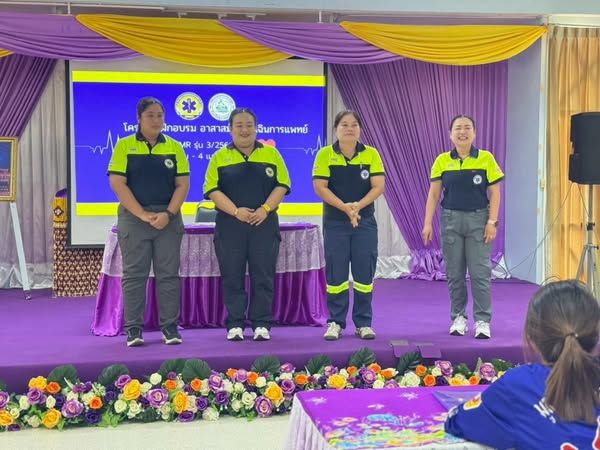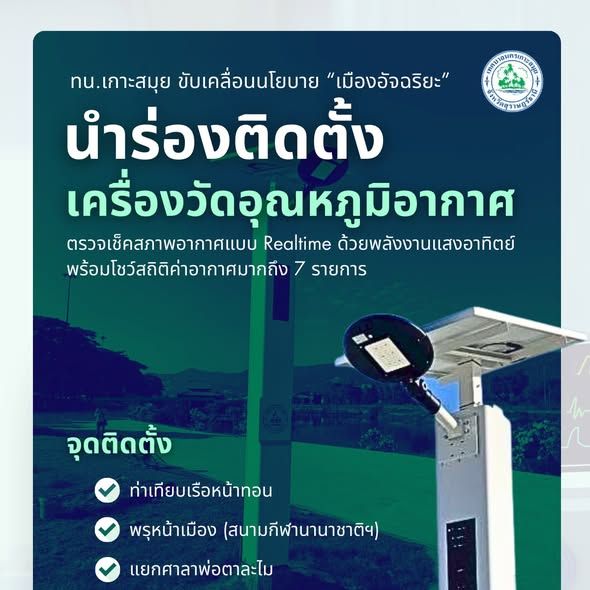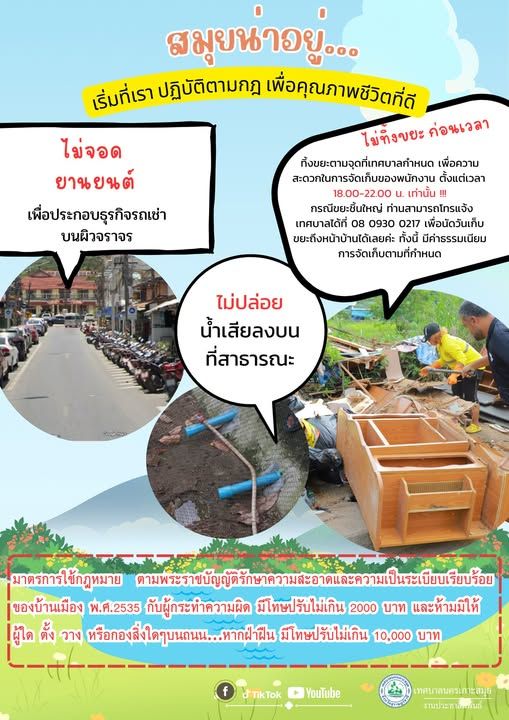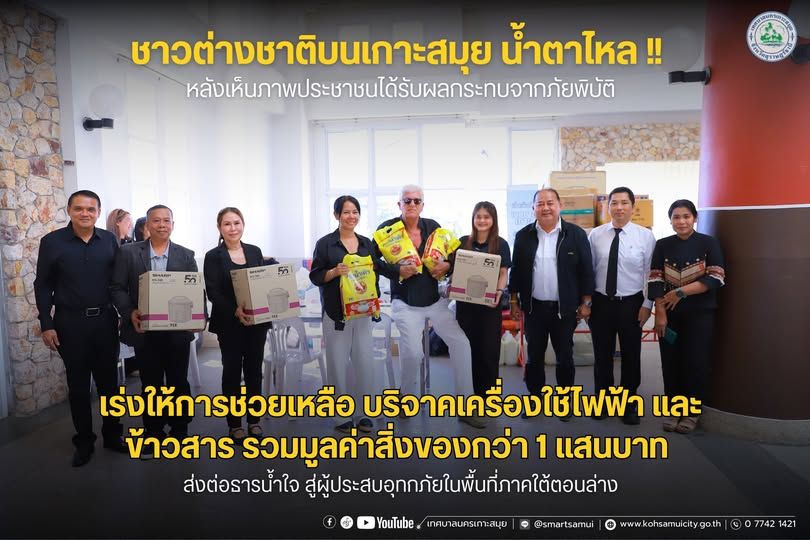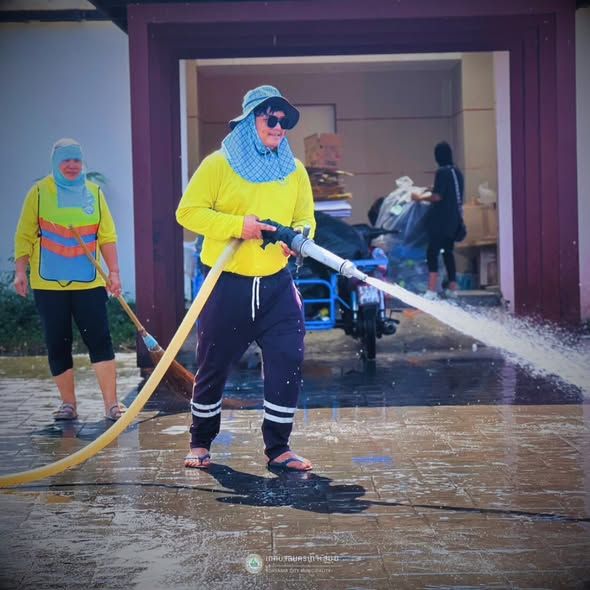Koh Samui is set to empower 40 local volunteers with a comprehensive 5-day emergency medical responder training program, equipping them with critical lifesaving skills from CPR to trauma care. The innovative initiative by the Public Health and Environment Division aims to create a more prepared and resilient community, transforming ordinary citizens into potential heroes during emergencies.
KohSamui #EmergencyResponse #VolunteerHeroes #PublicHealth #LifesavingSkills #ThailandTravel #CommunityDevelopment #SafetyFirst #TrainingProgram #MedicalEmergency
The Public Health and Environment Division, in collaboration with the Public Health Service Center, has announced the implementation of the Emergency Medical Responder (EMR) Training Project for the fiscal year 2025. The initiative is set to take place from March 31 to April 4, 2025, at the Talingngam Conference Room, Koh Samui Vocational College. This training aims to enhance the capabilities and preparedness of local emergency medical volunteers to deliver high-quality pre-hospital care.
Objectives of the Training
The primary objectives of the EMR training project include:
- Capacity Building: To equip 40 selected local volunteers with up-to-date skills and knowledge in emergency medical response.
- Standardization: To align the skills and competencies of volunteers with the requirements set by the National Institute for Emergency Medicine.
- Readiness and Availability: To guarantee that emergency medical volunteers are prepared to provide 24-hour service to the public.
- Continuity of Service: To ensure that volunteers can consistently meet the demands of emergency situations and maintain high standards of public health response.
Target Participants
The training project specifically targets a group of 40 emergency medical volunteers from the Koh Samui area. By focusing on local participants, the program seeks to strengthen the immediate community response to emergencies and foster a network of skilled responders on the island.
Training Curriculum and Methodology
The curriculum for the EMR training is designed according to national standards and is delivered by an expert team of lecturers from the Surat Thani Provincial Public Health Office. The training includes a blend of theoretical instruction and practical exercises, such as:
- Basic Life Support (BLS): Techniques for cardiopulmonary resuscitation (CPR) and management of airway obstructions.
- Trauma Care: Initial assessment and stabilization of trauma patients, including bleeding control and fracture management.
- Medical Emergencies: Response protocols for heart attacks, strokes, diabetic emergencies, and other acute medical conditions.
- Scene Safety and Triage: Ensuring responder safety and effective prioritization of patient care in multi-casualty incidents.
- Communication and Coordination: Best practices for collaborating with advanced EMS units and other healthcare providers.
Importance of Annual Refresher Training
According to the National Institute for Emergency Medicine, annual refresher training is mandatory for EMR volunteers. This requirement ensures that responders stay updated on evolving protocols, new equipment, and emerging health threats. Regular training also helps volunteers retain their skills, improve response times, and reduce errors during actual emergencies.
Role of the Surat Thani Provincial Public Health Office
The Surat Thani Provincial Public Health Office plays a central role in delivering the EMR training. The office provides experienced instructors and oversees the quality and relevance of the course content. Its involvement ensures that the training is in line with provincial and national health strategies, supporting the overall emergency medical service infrastructure.
Significance for Koh Samui and the Surrounding Region
Koh Samui, as a major tourist destination and large local community, faces unique public health challenges. A well-trained cadre of EMR volunteers is crucial for maintaining safety and public confidence. The training project not only benefits the direct recipients but also contributes to a stronger, more efficient emergency response network across the region, supporting both residents and visitors.
Logistics and Implementation
- Date and Time: March 31 to April 4, 2025, starting 8:30 a.m. daily
- Venue: Talingngam Conference Room, Koh Samui Vocational College
- Organizers: Public Health and Environment Division, Public Health Service Center
- Trainers: Surat Thani Provincial Public Health Office
This structured approach ensures that the EMR training project delivers practical, up-to-date knowledge and skills, enhancing the community’s ability to respond to medical emergencies effectively and professionally.
Frequently Asked Questions
Frequently Asked Questions (FAQ) – EMR Training Project for Fiscal Year 2025
What is the main purpose of the EMR Training Project in Koh Samui, and who can participate?
The primary purpose of the EMR Training Project is to strengthen Koh Samui’s emergency response capacity by equipping 40 local volunteers with essential lifesaving skills, including CPR, trauma care, and medical emergency management. Participation is targeted specifically at emergency medical volunteers from the Koh Samui community, aiming to build a skilled local network ready to respond to emergencies both for residents and visitors.
What does the 5-day training program cover, and how is it structured?
The training program, held from March 31 to April 4, 2025, combines theoretical lessons with hands-on practical exercises. The curriculum, delivered by expert instructors from the Surat Thani Provincial Public Health Office, covers:
- Basic Life Support (BLS): CPR and airway management techniques
- Trauma Care: Bleeding control, fracture stabilization, and initial trauma assessment
- Medical Emergencies: Responding to heart attacks, strokes, diabetic crises, and more
- Scene Safety and Triage: Ensuring responder safety and patient prioritization in complex emergencies
- Communication & Coordination: Collaborating with EMS and healthcare providers
This approach ensures volunteers meet national standards and are ready for 24-hour emergency response.
Why is annual refresher training required for EMR volunteers, and how does it benefit the community?
Annual refresher training, mandated by the National Institute for Emergency Medicine, is crucial for maintaining high-quality emergency care. It ensures that EMR volunteers:
- Stay up-to-date with the latest protocols, medical advancements, and equipment
- Retain and sharpen critical lifesaving skills
- Improve response times and reduce the potential for error during real emergencies
By keeping volunteers well-prepared, the program increases community safety and resilience, providing both residents and tourists with greater confidence in Koh Samui’s emergency medical response capabilities.
